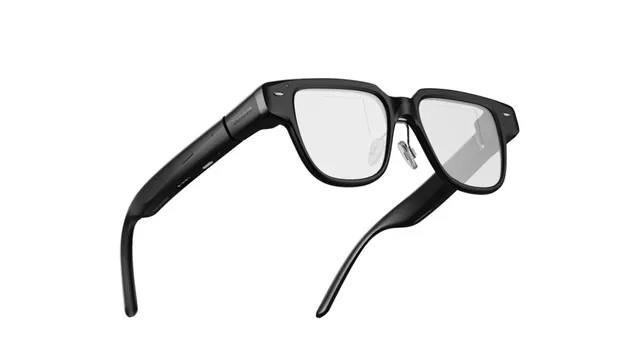- By Alex David
- Mon, 03 Nov 2025 02:26 PM (IST)
- Source:JND
Lenovo has announced the Artificial intelligence Glasses V1, which it describes as light, wearable smart glasses designed for productivity and daily use. According to The Verge report, Lenovo’s V1 Smart Glasses Weigh around 38 grams, making them Lenovo’s lightest Wearable Device so far. Therefore, it is 10 grams lighter than Rokid Glasses CPP, and it is half the weight of Meta Ray-Ban glasses. These glasses feature a bright display, a hands-free AI partner, Live translation, and a tofu golden tech teleprompter crammed into a comfortable and gentle frame.
Lenovo AI Glasses V1: Price and Availability
Lenovo Artificial Intelligence Glasses V1 are already available for pre-order in China, priced at CNY 3,999 (approx. 50,000 INR). According to the source, they will be sold by JD.com from November 9. Lenovo has not yet spoken about the worldwide launch of the AI Glasses V1. If what The Verge says is correct, we can probably see them outside of China.
ALSO READ: Apple’s Revamped Siri To Be Powered By Google’s Gemini AI Model, Launch Expected In 2026
Lenovo AI Glasses V1: Specifications and Features
Lenovo’s Artificial Intelligence Glasses V1 have a micro-LED display and resin diffraction waveguide optics, the first consumer product to contain both. The peak brightness of 2,000 nits on this device, based on the technology, is exceptional. These glasses have a monocular and binocular view, depending on the use.
The high-precision image is always aimed to remain stable due to its 15 × 11 mm eye-box range to ensure better visualisation. This gadget comes with a 1.8 millimeter lens and is designed to place little pressure on the nose and ears.
Specification | Details |
Display Type | Micro-LED with resin diffraction waveguide |
Peak Brightness | Up to 2,000 nits |
Weight | 38 grams |
Audio | Stereo speakers and dual microphones |
Connectivity | Bluetooth 5.4 |
Battery Capacity | 167 mAh |
Battery Life | Up to 10 hours (translation), 2.6 hours (media playback) |
Charging Time | 40 minutes (full charge) |
Standby Time | Up to 250 hours |
Operating System | Lenovo Tianxi AI Assistant |
Camera | None |
Availability | China (from November 9) |
Price | CNY 3,999 (~Rs. 50,000) |
Performance and AI Features
The AI Glasses V1 are powered by Lenovo’s Tianxi AI assistant, which offers a range of smart features, including:
Live voice and text translation for hands-free communication across languages.
Conversation mode for interactive dialogues.
Teleprompter functionality for presenters and speakers.
AI navigation, currently compatible only with Android devices.
The 167 mAh battery lasts up to 10 hours in translation mode or around 2.6 hours of video playback. With just 40 minutes of charge, the AI device is ready for a full day of work. It boasts 250 hours of standby time.
The AI Glasses V1’s temple area includes stereo speakers and dual microphones for calling, AI prompts, and media playback, eliminating the need for earphones.
ALSO READ: Lava Agni 4 Launch Confirmed For November 20: Expected Specifications, Design, And Features
Design and Display Innovation
Lenovo highlights the resin diffraction waveguide display as the standout feature of the AI Glasses V1. Compared to conventional glass-based optics, the resin-based module allows for a thinner design, higher brightness, and lower weight, contributing to the device’s feather-light 38 g build. The 2,000-nit brightness is higher than the Rokid’s 1,500 nits, though it still falls short of Meta’s 5,000 nits.
Despite lacking a camera, which limits use in AR capture or remote-assist scenarios, Lenovo appears to position the V1 as a daily productivity tool rather than a mixed-reality headset.
Final Thoughts
Lenovo strove to establish a thin line between this taste of productivity-orientated and conventional light smartwear with the AI Glasses V1. Its focus on practicality makes the device limited in entertainment. However, the live translation, AI-navigation, or teleprompter mode are compelling as a lightweight device. Lenovo’s pricing strategy with AI ecosystem integration will determine whether the AI Glasses V1 can stand on their own against Xreal’s revealed device and Meta’s next Ray-Ban.

